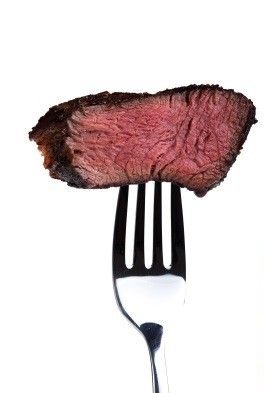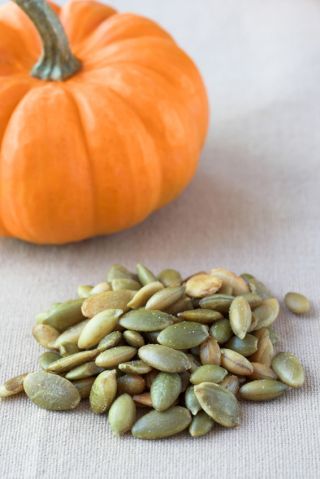Do you nibble when you get anxious? Most of us do! I recently spoke to my colleague and fellow author, Trudy Scott. Check out these 5 foods (paired with mindful eating!) that help you to be a happier, calmer you. Not only do these food taste great but Trudy highlights the science to back up their ability to mellow out your mood.
1) Grass-fed red meat

1) Grass-fed red meat
Include quality animal protein such as red meat in your diet. Opt for choices that are grass-fed and free of hormones and antibiotics, and humanely treated. Grass-fed red meat contains amino acids, zinc, iron and good levels of omega-3s – all of which are so crucial for balancing brain chemicals like serotonin – improving both anxiety and depression, and reducing emotional eating and cravings.
A 2010 Australian study looking at both anxiety and depression among women found a link between better diet quality and better mental health. Among the participants, those who ate a whole foods “traditional” diet of vegetables, fruit, fish, whole grains, and grass-fed lean red meat and lamb had a lower likelihood of both anxiety and depression. Those who ate a typical Western diet of processed and refined foods and beer were more likely to experience depression.
(2) Pumpkin seeds

(2) Pumpkin seeds
Research has actually shown that a medical or functional food made with pumpkin seeds reduced anxiety and social phobia. In another study this same functional food was also shown to improve sleep. Because pumpkin seeds are a great source of zinc and tryptophan, they likely raise serotonin, thereby reducing anxiety and improving mood and sleep. Enjoy a snack of roasted pumpkin seeds. Here is a delicious spicy roasted pumpkin seed recipe I share with my clients http://www.everywomanover29.com/blog/soaked-nuts-and-pumpkin-seed-recipe/
(3) Sauerkraut and other fermented foods
Some fermented foods are familiar, like sauerkraut and yogurt. Others may seem a bit more exotic, like kefir (including water kefir), kimchi (an Asian pickled vegetable dish), and kombucha (fermented tea). Because of the enormous health benefits of probiotics, more fermented foods are becoming available. You might look for fermented salsa or salad dressings in the refrigerated section of natural food stores, or make your own. It’s great to include these foods in your daily diet and they are typically eaten in small amounts.
Fermented foods are a traditional food with a long and venerable history. They contain enzymes and probiotics, which help maintain a healthy balance of flora in the gut, supporting digestive health and brain health. A 2009 study looking at people with chronic fatigue syndrome and an imbalance in intestinal bacteria supports the powerful gut-brain-mood connection, finding that those treated with probiotics not only had greater numbers of beneficial bacteria, but also had a significant decrease in anxiety and depression (http://www.ncbi.nlm.nih.gov/pubmed/19338686).
4) Rooibos herbal tea

4) Rooibos herbal tea
Recent research has found that stressed and anxious women may have an increased risk of heart disease and even stroke. Rooibos is a South African herbal tea that is naturally caffeine free and drinking this tea may just offer some protective since it’s antioxidant-rich and anti-inflammatory (http://www.ncbi.nlm.nih.gov/pubmed/19419525). And a 2013 animal study found rooibos tea to actually be cardioprotective. It’s also a great replacement for coffee, which we know increases anxiety in many people.
I grew up in South Africa and drank rooibos tea there and continue to drink it here on a daily basis. It’s delicious black, with no sugar and a dash of lemon juice and can be purchased in most grocery stores and health stores.
5) Organic leafy greens like spinach
Symptoms of low magnesium include anxiety, fatigue, weakness, and irritability, and leafy greens are a great source of magnesium. Organic is recommended because leafy greens like spinach and kale are on the Environmental Working Group’s (www.ewg.org) list of “Dirty Dozen” fruits and vegetables with the highest pesticide residues. A 2012 paper states that: “The association between pesticide exposure and neurobehavioral and neurodevelopmental effects is an area of increasing concern.” (http://www.ncbi.nlm.nih.gov/pubmed/22269431)
Thank you Trudy for sharing your insights and recommendations!
~Trudy Scott, Food Mood Expert and Certified Nutritionist, author of “The Antianxiety Food Solution: How the Foods You Eat Can Help You Calm Your Anxious Mind, Improve Your Mood, and End Cravings”(New Harbinger, June 2011)
For a FREE Download of 10 Foods to Boost Your Mood PLUS a flow chart on understanding Emotional vs. Physical Hunger see: http://eatq.com/food-mood/
Dr. Susan Albers is a psychologist at the Cleveland Clinic and author of 5 books on mindful eating including her latest, EatQ, which will help you make food decisions like a CEO! Dr. Albers is often quoted in Prevention, Shape & Health Magazine. She believes that mindful eating is the key to: "Eat Less, Enjoy More!" www.eatq.com
"Like" us on facebook: www.facebook.com/eatdrinkmindful




